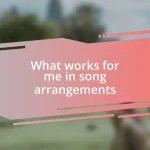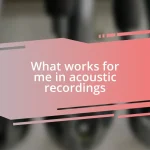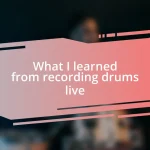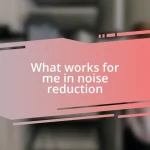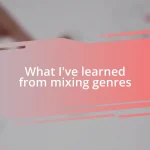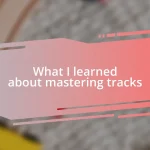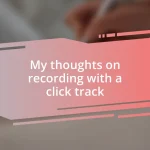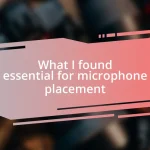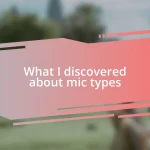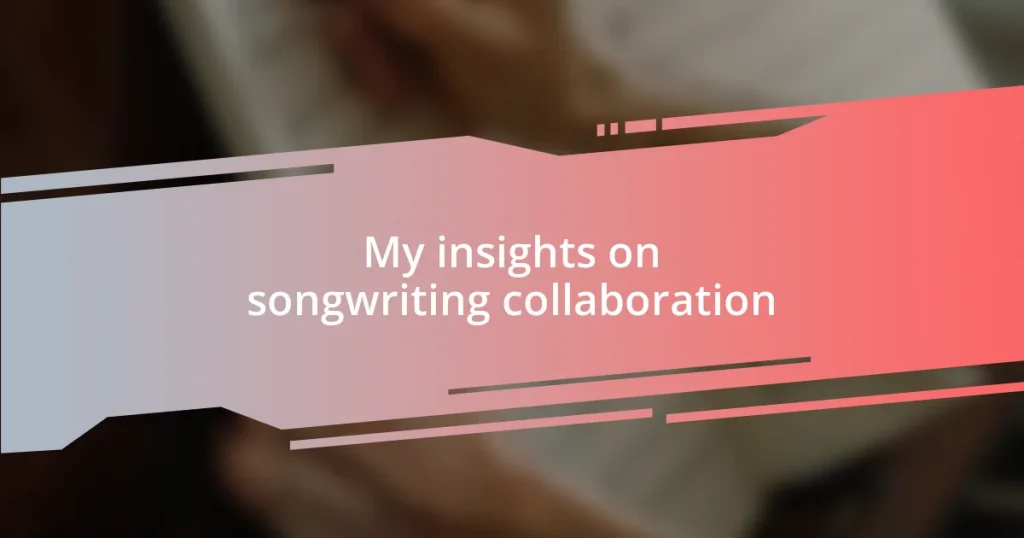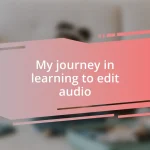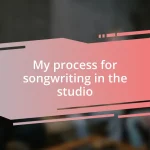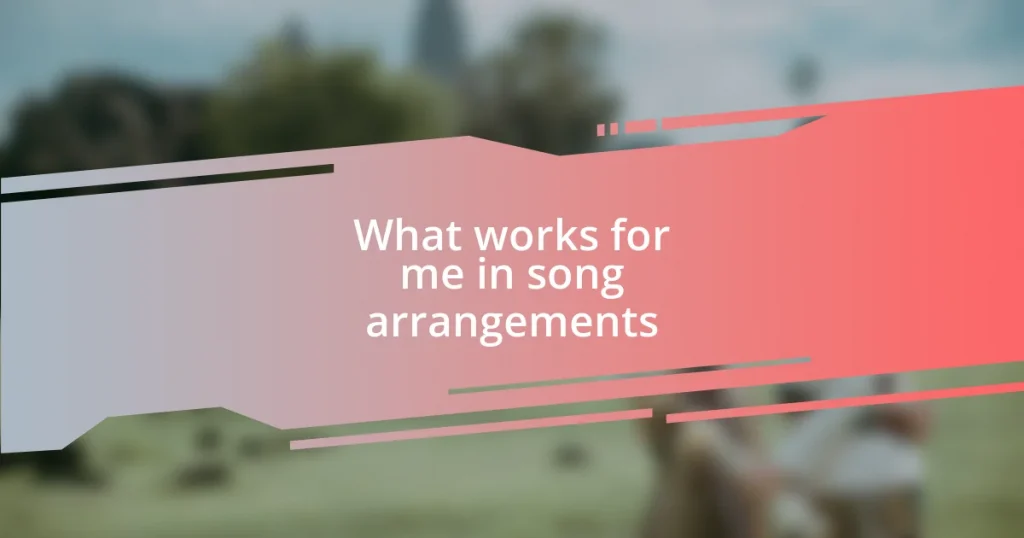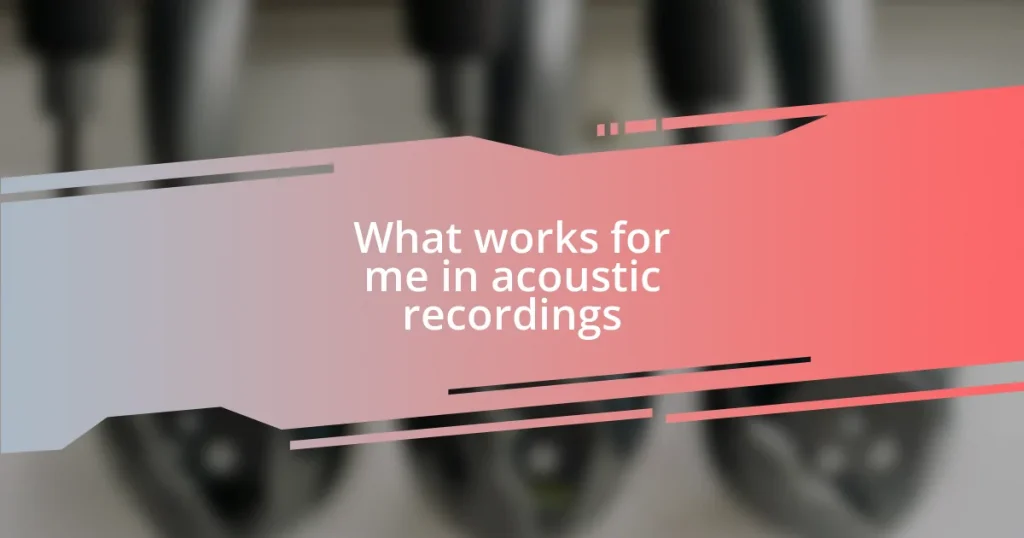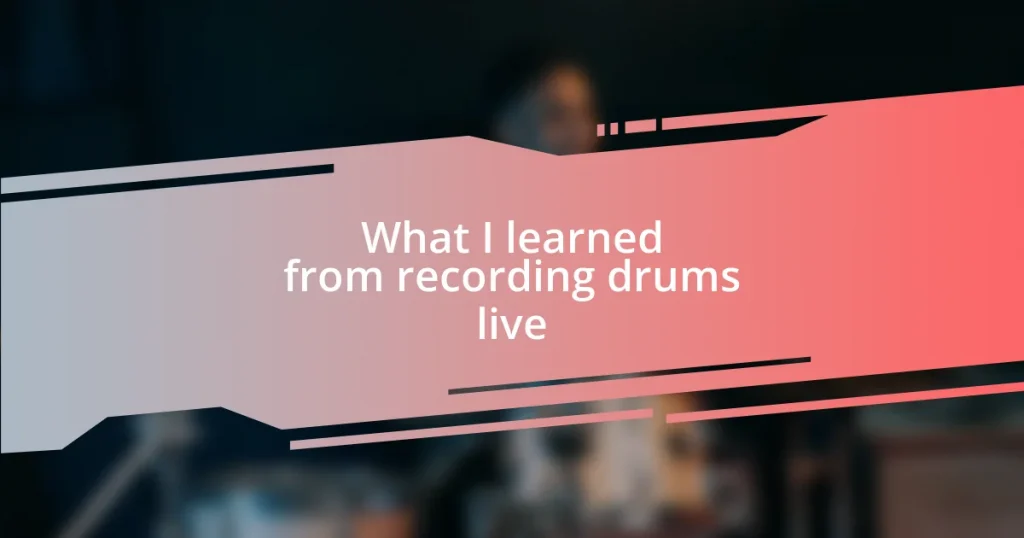Key takeaways:
- Collaboration enhances creativity through diverse perspectives, leading to richer lyrics and dynamic melodies.
- Effective communication, including active listening and clarity, is essential for overcoming creative differences and fostering a productive environment.
- Setting clear goals and maintaining flexibility are crucial for accountability and navigating challenges in songwriting partnerships.
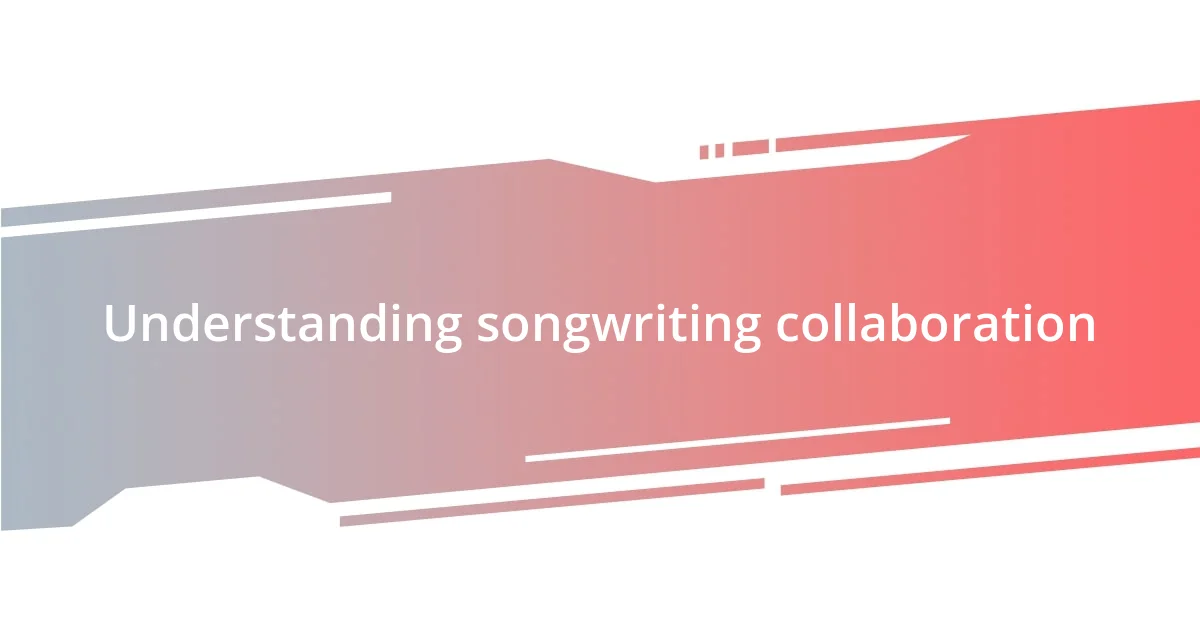
Understanding songwriting collaboration
Songwriting collaboration is a fascinating dance of creativity, where each partner brings their unique perspective and talents to the table. I vividly remember a time when I co-wrote a song with a friend who had a completely different musical background. It was enlightening to see how our contrasting styles blended seamlessly, creating something vibrant that neither of us could have achieved alone. Have you ever found yourself surprised by how collaborative efforts can lead to unexpected yet beautiful outcomes?
At its core, collaboration is about listening and adapting. I often find that the best ideas emerge not from one person dominating the conversation, but from an open exchange where every voice is valued. I once struggled with a chorus section until my co-writer suggested we change the tempo. That small shift opened the floodgates of creativity, and we ended up with a catchy hook that still gets stuck in my head!
Moreover, collaboration fosters a sense of community and support among songwriters. When I team up with others, I feel a shared investment in the outcome, which fuels our passion and creativity. Isn’t it incredible how working together can create bonds that extend far beyond the music itself?
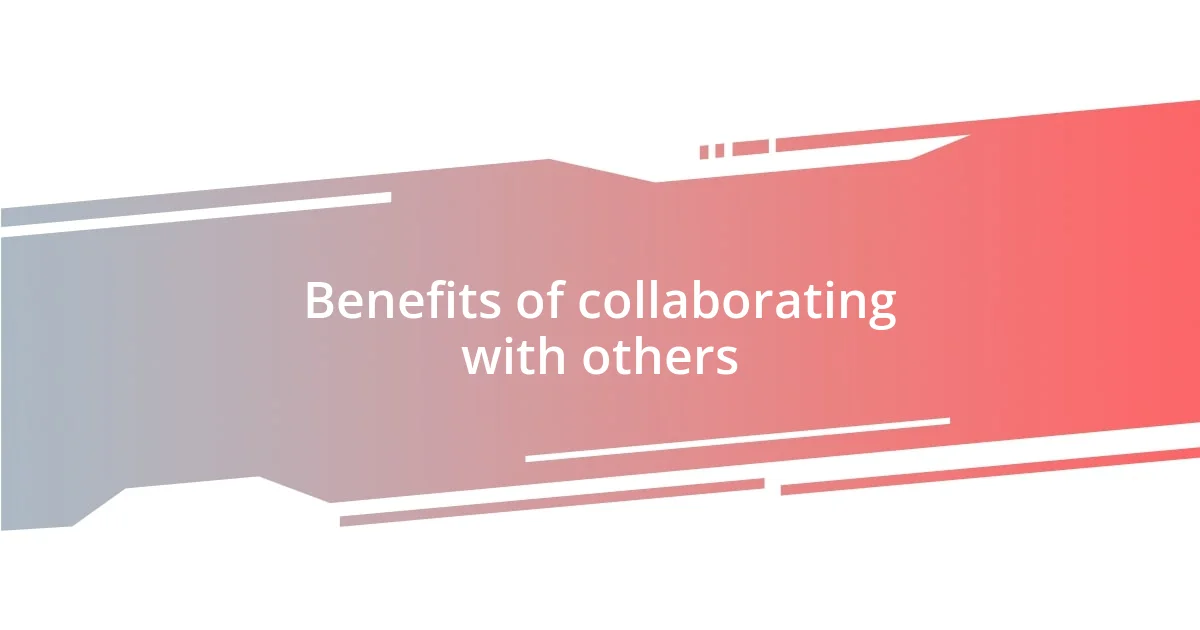
Benefits of collaborating with others
Collaborating with others in songwriting not only enhances creativity but also inspires a deeper connection to the music. I’ve found that blending different viewpoints often leads to richer lyrics and more dynamic melodies. For instance, during a recent writing session, my collaborator shared a personal story that completely shifted the direction of our song. That raw emotion inflected our work with such authenticity that I know it resonates with listeners on a profound level.
Here are some key benefits of collaborating with others:
– Diverse Perspectives: Different experiences can spark new ideas, leading to richer songwriting.
– Shared Workload: When tasks like brainstorming and arranging are shared, it relieves pressure on individuals.
– Creative Growth: Working with varied talents helps refine one’s skills through observation and practice.
– Emotional Support: Songwriting can be an emotional rollercoaster; having a co-writer can provide much-needed encouragement.
– Networking Opportunities: Collaborators often introduce you to new circles within the music industry, expanding your reach.
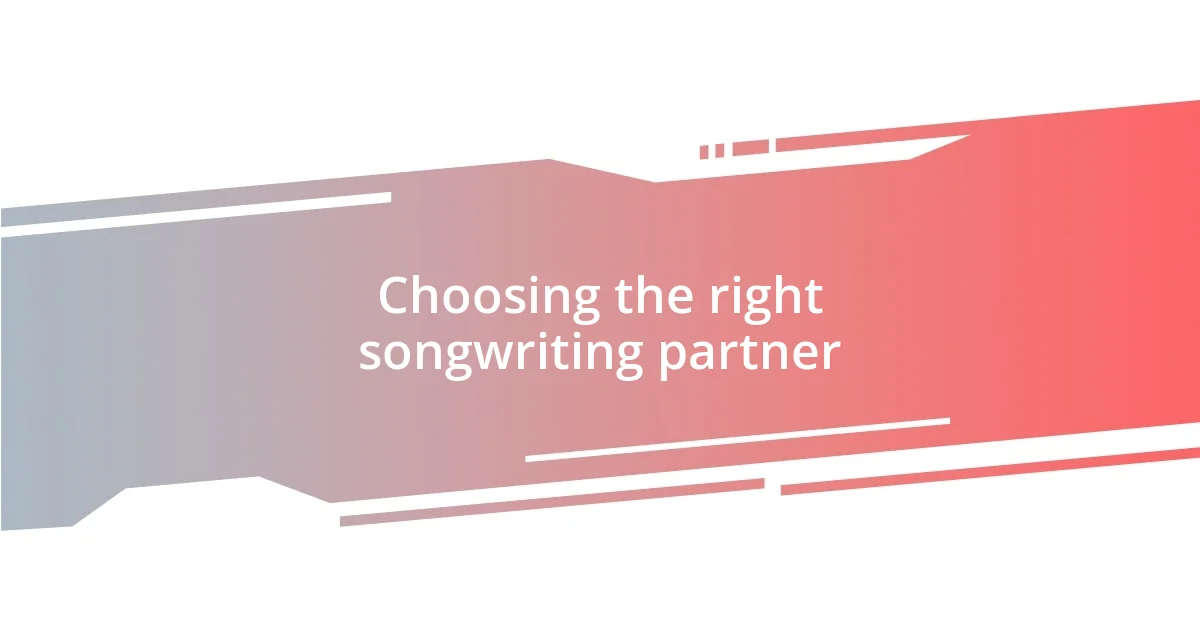
Choosing the right songwriting partner
Choosing the right songwriting partner is crucial to ensuring a successful collaborative experience. I’ve personally learned that chemistry is even more important than skill level. When I worked with a partner I genuinely connected with, we could effortlessly bounce ideas off one another. What’s your experience like when you find that spark with another songwriter?
It’s also vital to consider complementary strengths. I once teamed up with an instrumentalist whose ability to create intricate melodies perfectly complemented my knack for lyric writing. This balance made our songwriting sessions incredibly fruitful and exciting. Have you ever noticed how different abilities can enhance the creative process?
Finding a partner who shares your vision can be transformative. There have been times where I’ve written with someone who had differing goals, and navigating our priorities was challenging. By choosing a co-writer whose ambitions align with mine, I feel we can pursue our artistic objectives harmoniously, making the entire process more enjoyable and productive.
| Criteria | Considerations |
|---|---|
| Chemistry | A strong connection can foster better collaboration. |
| Complementary Strengths | Matching skills can enhance creativity. |
| Shared Vision | An aligned ambition leads to a smoother process. |
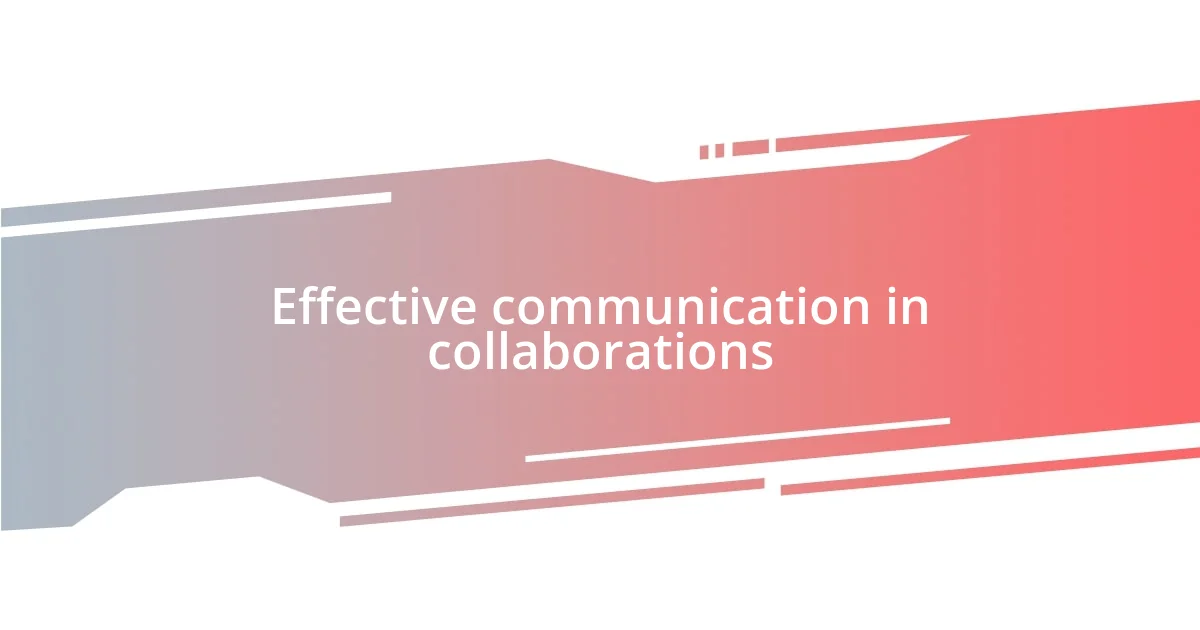
Effective communication in collaborations
Effective communication is the backbone of any successful songwriting collaboration. I remember a time when I was co-writing a song with a friend, and we hit a roadblock. Instead of letting frustration build up, we decided to have an open conversation about our feelings and ideas. This honesty not only cleared the air but also allowed us to explore diverse viewpoints, ultimately leading us to a breakthrough in our lyrics. Have you ever found that a simple conversation can shift everything in your creative process?
Listening is equally important in these partnerships. I’ve often noticed that the best ideas come when both parties feel heard and valued. There was a particular session where my collaborator presented a melody, and I hesitated to share my thoughts initially. However, when I voiced my ideas with sincerity, we found common ground that transformed our initial concept into something truly special. Isn’t it amazing how just one opinion can enrich a project?
Additionally, clarity is key to keeping everyone on the same page. I’ve encountered situations where misunderstandings arose simply because of vague communication. Once, during a brainstorming session, I assumed my partner understood the theme I had in mind, but they had a completely different image. After discussing our visions explicitly, we were able to harmonize our ideas, and the song flourished. How do you ensure that everyone in your collaboration is aligned?
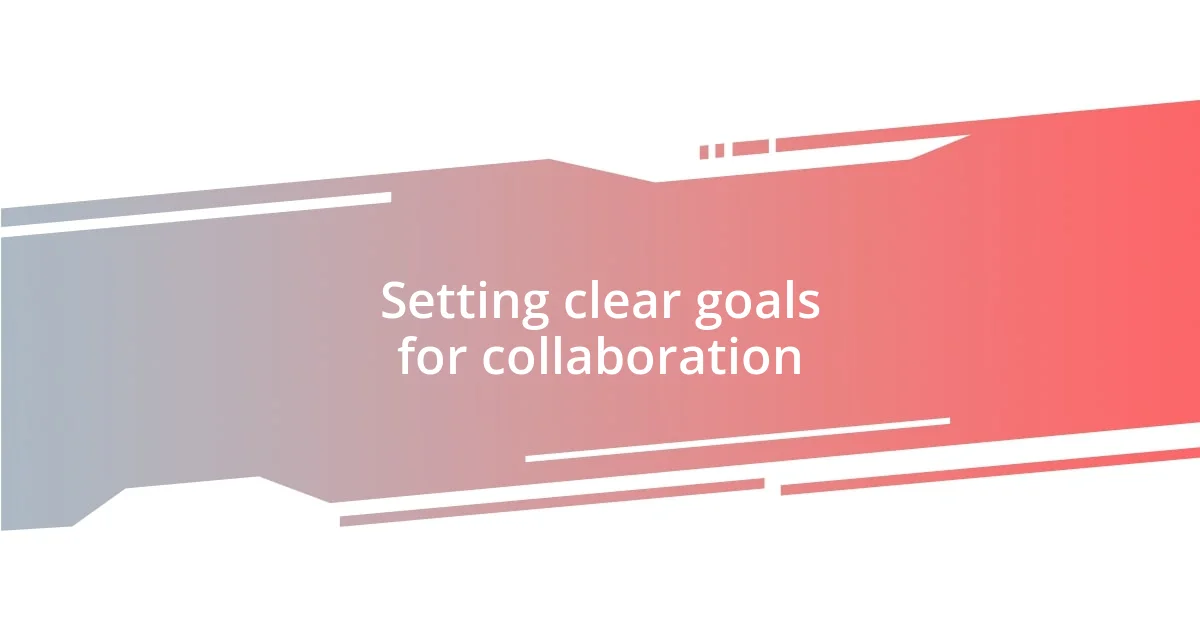
Setting clear goals for collaboration
Setting clear goals is essential for a fruitful songwriting collaboration. I remember when I embarked on a project with a fellow songwriter, and we took the time to outline what we hoped to accomplish. By identifying our goals upfront, we created a roadmap that guided our sessions, making it easier to stay focused and measure our progress. Have you ever felt lost in a creative process? Setting those benchmarks can prevent that feeling.
Creating specific, achievable objectives fosters accountability. I once worked with a partner who suggested we explicitly define our target audience before diving in. This not only sparked relevant ideas but also reinforced our commitment to the project. When everyone knows what’s at stake, the energy in the room shifts to a more collaborative and dedicated atmosphere. How do you hold yourself and your teammates accountable during a project?
Finally, regularly revisiting and adjusting those established goals is vital. I’ve experienced times when I became so engrossed in the creative flow that I lost sight of what we initially set out to achieve. By checking in with each other, we were able to realign our vision and ensure we were still heading in the right direction. How often do you pause to reflect on your collaborative journey? These touchpoints can be transformative, strengthening the bond between collaborators and enhancing the overall outcome of the song.
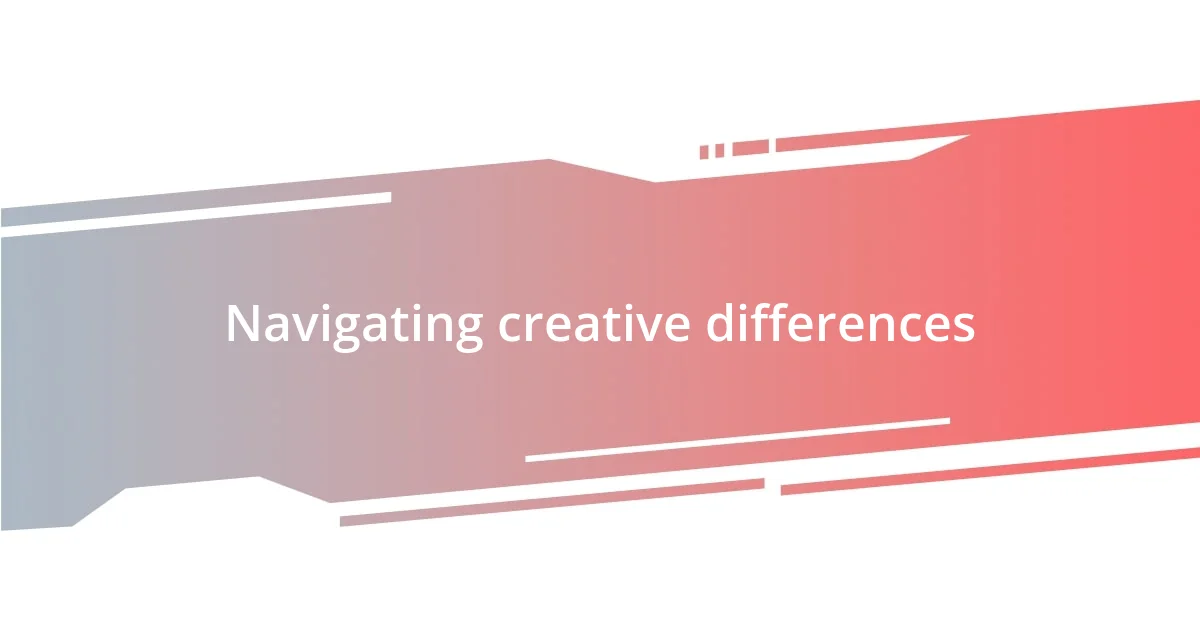
Navigating creative differences
Creative differences can be challenging, but they often lead to the most rewarding outcomes. I recall a session where my collaborator and I had starkly different visions for a melody. Instead of arguing, we took a step back and shared why we felt so passionately about our ideas. That moment of vulnerability turned our conflict into a collaborative experiment, and we ended up blending our styles in a way that neither of us had considered before. Have you ever experienced a similar shift, where opposing views pushed you to innovate?
It’s crucial to view disagreements as opportunities rather than obstacles. I’ve found that when my initial reaction is defensiveness, it can stall the creative process. Once, a co-writer suggested we change a bridge that I was emotionally attached to; my first instinct was to resist. But after taking a deep breath and listening to their reasoning, I realized they were onto something. It transformed my perspective and ultimately strengthened the song. How do you typically react when faced with conflicting ideas?
Collaboration requires flexibility and a willingness to compromise. I remember working on a project where one line had us at an impasse. Rather than become stubborn about it, we took a playful approach—each of us wrote down our version and shared them spontaneously. This fun exercise broke the tension and, unexpectedly, led to a solution that satisfied us both. Don’t you think that approaching creative differences with a sense of play could unlock new potential in your songwriting?
